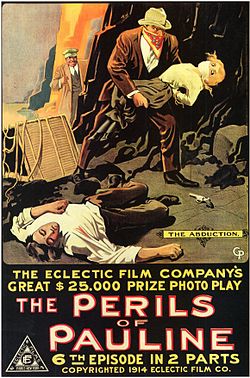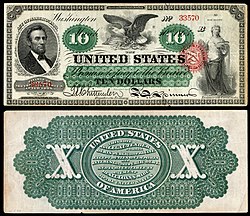0-9
- 86
- 1. Soda-counter term meaning an item was no longer available [2]
- 2. "Eighty-six" means to discard, eliminate, or deny service [2]

This glossary of early twentieth century slang in the United States is an alphabetical collection of colloquial expressions and their idiomatic meaning from the 1900s to the 1930s. This compilation highlights American slang from the 1920s and does not include foreign phrases. The glossary includes dated entries connected to bootlegging, criminal activities, drug usage, filmmaking, firearms, ethnic slurs, prison slang, sexuality, women's physical features, and sports metaphors. Some expressions are deemed inappropriate and offensive in today's context.
While slang is usually inappropriate for formal settings, this assortment includes well-known expressions from that time, with some still in use today, e.g., blind date , cutie-pie , freebie , and take the ball and run . [1]
These items were gathered from published sources documenting 1920s slang, including books, PDFs, and websites. Verified references are provided for every entry in the listing.

Example
A "cotton glaumer" picks cotton, an "apple knocker" picks apples and other fruit
— 1923 book by Nels Anderson [11]


Area in the south and midwest where fundamentalism flourishes [25]

Prison [32]
Tough guy or strong man; see also hard-boiled Bruno [5]

An appointment is set for a show or dance where your partner is someone you don't know, usually a friend of a friend [39]




Example
"It calls for a picked clientele of fans who are able to visualize and distinguish mortal from immortal as portrayed in the flesh. It will not appeal to the Flapper, the Lounge Lizard and Cake Eater, nor to the less intelligent."
— 1923 Exhibitor's Trade Review assessment of the film – Puritan Passions [87]
Example
The Rent Collector (Vitagraph), with Larry Semon — A scream, a whirlwind, a cyclone of fun. For action and real fun his comedies are the snake's hips and the cat's meow.
— 1923 Exhibitors Herald Patron's Movie Review [99]


Example
Browne finds a dead woman, whose jewels are missing. Foumier discovers that Browne is a cocaine fiend, and . . .
— 1916 Moving Picture World Review of No. 16 Martin Street [119]
Example
Wanted: Love *** Abe has Coin *** Girls Kid him
— 1915 Article Headline of Abe Deuce's letter to the editor of Los Angeles Record [122]
Example
Newspaper article states addicts are nicknamed according to the kind of drug they use e.g.one addicted to cocaine is called a cokehead,coke,snowbird,sniffer.
— 1923 newspaper article explaining drug usage and terms [84]
Example
They Like 'Em Rough,' with Viola Dana. – Comedy-drama in which a husband uses cave man tactics to make his flapper wife come to time
— 1922 Exhibitors Herald Movie Review [125]
Example
. . .Audrey to get her some coke. Audrey calls Max, the piano player, and he gives her a deck, which Cleo pretends to take
— 1916 Moving Picture Weekly Review of No. 16 Martin Street [149]

Example
After his arrival, Dippy filches many of the guests of their valuables
— 1922 Exhibitors Herald Movie Review [175]

Example
They Like 'Em Rough,' with Viola Dana – Comedy-drama in which a husband uses cave man tactics to make his flapper wife come to time
— 1922 Exhibitors Herald Movie Review [125]

Example
Flyers made from San Francisco to Hawaii. It is just a hoak meller that will, for the better part, carry in some of the smaller grindhouses.
— 1926 Variety Movie Review [220]

Example
flyers made from San Francisco to Hawaii. It is just a hoak meller that will, for the better part, carry in some of the smaller grindhouses.
— 1926 Variety Movie Review [220]
Example
. . . where Nazimova comes to a house of refuge, not knowing that Sills is there, and is pronounced dying by physicians, but is saved by Sills' prayer. To us who make and sell pictures, this "saved by prayer" situation registers as hokum, but just the same it has a genuine wallop for most of your customers, and consequently this final sequence effectively tops a very good red meat dramatic yarn.
— 1924 Wid's Movie Review [255]
Example
In the park awaiting her train home she meets Forrest Chenoworth, a rich idler, whose money has gotten him into trouble with a lady named Jane.
— 1920 Wid's Daily Movie Review [271]



Example
"His thousands of admirers are happy to know that no anti-toxin has yet been discovered to cure this master jazzman of his 'illness!'"
— 1926 newspaper article praising band leader Fred Hamm [281]
Example
It calls for a picked clientele of fans who are able to visualize and distinguish mortal from immortal as portrayed in the flesh. It will not appeal to the Flapper, the Lounge Lizard and Cake Eater, nor to the less intelligent.
— 1923 Exhibitors Trade Review Movie Review [87]
Example
She plays a young wife whose husband falls for the assiduous attentions of a jazzy willo' the wisp. Many of the situations are mawkish and over sentimental, but Lila makes it all possible by her sincerity and poise.
— 1924 Photoplay Movie Review [333]





Example
Reviewing the 1928 "The Racket" – Eight January Chicago, racketeers who, for various good reasons, or on the lam and temporarily going straight in Los Angeles, we're rounded up and induced to work and this crook melodrama.
— 1928 Motion Picture Classic Movie Review [362]
Example
Dorothy Davenport handles the part of Violetta in an appealing manner, obtaining considerable pathos in the latter scenes
— 1916 issue The Moving Picture World [372]
Example
but the pickpocket upsets the boat by relieving a number of the guests of their valuables, and then being obliged to flee
— 1916 The Moving Picture World [175]

Example
I jammed the roscoe in his button and said, "Close your yap, bo, or I squirt metal."
— In his article for the Ottawa Citizen, William Denton mentioned Sam Spade, the famous detective character from Dashiell Hammett's works, quoting him as saying: [19]


Example
The two sharpers escape and join another member of the confidence game.
— 1916 The Moving Picture World [440]


Example
I jammed the roscoe in his button and said, "Close your yap, bo, or I squirt metal."
— In his article for the Ottawa Citizen, William Denton mentioned Sam Spade, the famous detective character from Dashiell Hammett's works, quoting him as saying: [19]
Example
. . . where Nazimova comes to a house of refuge, not knowing that Sills is there, and is pronounced dying by physicians, but is saved by Sills' prayer. To us who make and sell pictures, this "saved by prayer" situation registers as hokum, but just the same it has a genuine wallop for most of your customers, and consequently this final sequence effectively tops a very good red meat dramatic yarn.
— 1924 Wid's Movie Review [255]
Example
In the park awaiting her train home she meets Forrest Chenoworth, a rich idler, whose money has gotten him into trouble with a lady named Jane. . . The alderman's son, a waster, is acquainted with Jane
— 1920 Wid's Daily Movie Review [271]
Example
I am a one-sided person—what you call, perhaps, a wet blanket. I don't smoke, I don't drink, I don't gamble, I don't dance. I like my home. I do not like boldness, lack of restraint.
— 1923 Photoplay interview of Joseph Schildkraut [522]
|
|
|
Slang of the 1920's The twenties were the first decade to emphasize youth culture over the older generations, and the flapper sub-culture had a tremendous influence on mainstream America; many new words and phrases were coined by these liberated women. Many of these are still used today!
Dictionary.com is the world's leading digital dictionary. Dictionary.com's main, proprietary source is the Random House Unabridged Dictionary and supplemented with established sources including American Heritage and Harper Collins
Compiled by William Denton
Listing copied from the authentic 1922 Flapper's Dictionary by Ella Hartung
The first known use of belly laugh was in 1916
Green's Dictionary of Slang is the largest historical dictionary of English slang
Abe Deuce's letter to the editor of Los Angeles Record
Dictionary.com is the world's leading digital dictionary
Slang of the 1920's The twenties were the first decade to emphasize youth culture over the older generations, and the flapper sub-culture had a tremendous influence on mainstream America; many new words and phrases were coined by these liberated women. Many of these are still used today!
Ordinary Production Given to Very Convenient Melodrama
Reviewed by Robert C. McElravy.
Green's Dictionary of Slang is the largest historical dictionary of English slang
Green's Dictionary of Slang is the largest historical dictionary of English slang
Green's Dictionary of Slang is the largest historical dictionary of English slang
Green's Dictionary of Slang is the largest historical dictionary of English slang
Green's Dictionary of Slang is the largest historical dictionary of English slang
Speakeasies and Jazz
Speakeasies and Jazz
Green's Dictionary of Slang is the largest historical dictionary of English slang
Green's Dictionary of Slang is the largest historical dictionary of English slang
Green's Dictionary of Slang is the largest historical dictionary of English slang
penlighten is a website about books
Books
Abridged edition of the New Dictionary of American Slang
Unabridged copy of 1996 Meriam-Webster publication of the same name
contents of original Joseph Sullivan's criminal slang: a dictionary of the vernacular of the underworld, first published by the detective pub company in 1908 and edited by Bill LeFurgy.
Glossary of Hard-Boiled slang of the 1920s through the 1940s
Web Slang Dictionaries and PDFs
Green's Dictionary of Slang is the largest historical dictionary of English slang
Slang of the 1920's The twenties were the first decade to emphasize youth culture over the older generations, and the flapper sub-culture had a tremendous influence on mainstream America; many new words and phrases were coined by these liberated women. Many of these are still used today!
Websites